PGW 2200 Softswitch TCAP Release 9.3 and Later
Available Languages
Contents
Introduction
Transaction Capabilities Applications Part (TCAP) provides support for interactive applications in a distributed environment. TCAP defines an end-to-end protocol between its users. This may be located in an SS7 network or another network that supports TCAP (IP).
Prerequisites
Requirements
Readers of this document should have knowledge of:
Components Used
The information in this document is based on the Cisco PGW 2200 Softswitch.
The information in this document was created from the devices in a specific lab environment. All of the devices used in this document started with a cleared (default) configuration. If your network is live, make sure that you understand the potential impact of any command.
Conventions
For more information on document conventions, refer to the Cisco Technical Tips Conventions.
Background Information
The TCAP protocol consists of two sub-layers:
-
Component sub-layer
-
Transaction sub-layer
The component sub-layer interfaces with the conversion engine. The conversion engine is the equivalent of a service user or subsystem number (SSN). The component sub-layer supports these services:
-
Association of operations and replies.
-
Abnormal situation handling.
The transaction sub-layer interfaces with Signalling Connection Control Part (SCCP). TCAP only supports a connectionless network service. The transaction sub-layer communicates with SCCP through the connectionless interface.
TCAP software uses the services of SCCP software to route the messages to the TCAP user in the destination node. The interface between the TCAP and the SCCP software is tightly coupled. Each TCAP request from the engine contains a global title and destination subsystem number. TCAP provides the subsystem number to SCCP for the Signal Transfer Points (STP) code look-up. If the SS7 addresses and routes are configured correctly and fully operational, troubleshoot the SCCP and TCAP information passed and received between the Cisco PGW 2200 and a remote SCCP or TCAP peer.
The Cisco PGW 2200 uses the SCCP to encapsulate TCAP queries for transport out Message Transfer Part (MTP). This SCCP communication between peers is sent without a connection over MTP. The Cisco PGW 2200 uses the SCCP Unidata (UDT) to send data to the remote SCCP node for connectionless communication. The PGW 2200 receives a valid response when the SCCP UDT message is delivered successfully. This is typically in the form of a UDT message. The exchange of these UDT messages facilitates the connectionless communication between the PGW 2200 and the remote SCCP peer (such as Service Control Point [SCP] for TCAP data base lookups). The PGW 2200 defines an optional field in the UDT that states the SCCP peer should "return on error" the contents of any message it sends to the remote node if the UDT message is undeliverable. The Unidata service (UDTS) message is used to facilitate this error response. The UDTS message indicates to the PGW 2200 that a UDT message received at the remote node (such as STP or SCP) cannot be delivered to the destination.
Cisco PGW 2200 Concept Setup 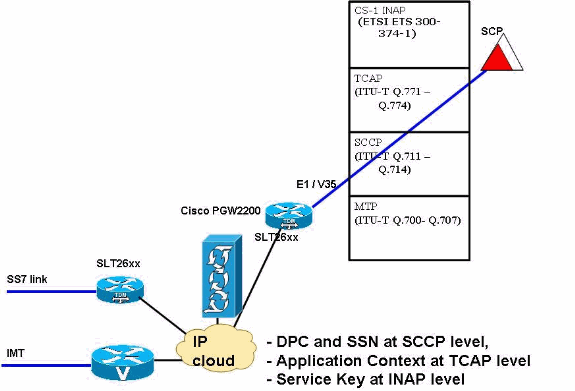
TCAP Resolution
The SCCP messaging (UDT/UDTS) discussed in the Background Information section is critical when you troubleshoot TCAP services and functionality. Resolve any problems at the SCCP layer before you troubleshoot TCAP data sent or received. The format of the UDT and the UDTS message is shown in Appendix C.
Use these Cisco PGW 2200 tools to debug calls that require the TCAP (TCAP / SCCP) services:
-
Sniffer the Ethernet line with tools such as Ethereal, UNIX snoop, and Snooper.
-
Platform.log TCAP trace on the PGW 2200.
-
MDL Trace Tool for call processing at the protocol level.
Sniffer the Ethernet Line
The Cisco PGW 2200 uses Reliable UDP (RUDP) to send MTP3 and upper layer SS7 messages between the local MTP1 and MTP2 devices (such as a Signaling Link Terminal [SLT]). This communication is typically done over port 7000 on the Cisco PGW 2200 local Ethernet interface. This is configurable. Refer to the configuration guide for details on configuring the PGW "stPort" ports in XECfgParm.dat.
You can use any Ethernet sniffer to view the packets sent between the Cisco PGW 2200 and its local MTP2 control device. However, not all of them support the MTP and SCCP protocol used to display a decoded message. If an Ethernet sniffer is not available to the customer, use the UNIX snoop command to troubleshoot. The output of the snoop command is not user friendly, but is helpful in a worst case scenario.
An Ethernet sniffer that supports the SS7 protocol stack is preferred. It allows you to decode packets seen on the Cisco PGW 2200 Ethernet interface. An open source sniffer such as Ethereal ![]() can also be used and is available online.
can also be used and is available online.
If no commercial sniffer utility is available, issue the snoop command on the target Cisco PGW 2200 to see the hex data output of the messages sent to and from the Cisco PGW 2200. With root permission on the Cisco PGW 2200, issue this command to see the hex data sent out of the configured 'stPort.' For additional information on the snoop command, refer to the 'snoop man pages' or the SUN Administrative guides.
#snoop -d <ethernet device name> -x 42 port <stPort>
Issue this command to snoop the packets sent out the Ethernet device, hmeX, on port 7000.
#snoop -d hmeX -x 42 port 7000
This is example output of captured SS7 packets with the snoop command.
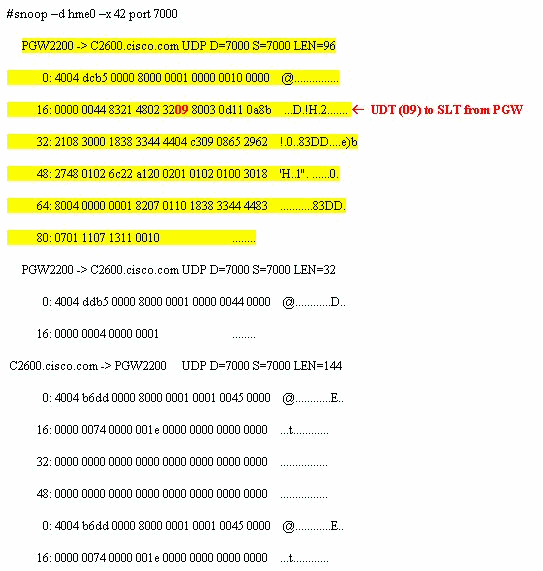
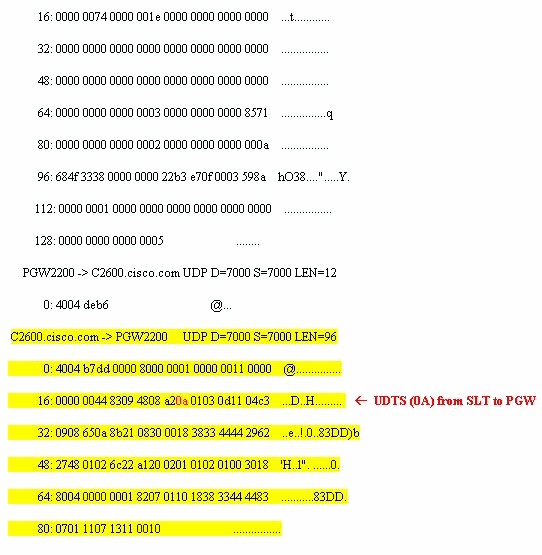
Cisco's Snooper can also be used (if available) to show the hex dump of the SCCP message. The SCCP message header is decoded but the display of the output is dependant on the version of Snooper chosen. The important point is that the message type is visible and gives an indication as to where to start to troubleshoot the call flow. The hex dump shows that message type 09 is a UDT message and message type 0a is the UDTS service message that indicates an error. The direction of the message flow is also useful since the SS7 PCs are shown. If the rest of the hex dump is shown (depends on the snooper version) it can be used to further decode the SCCP and TCAP portions of message. This is based on the industry standards for SCCP and TCAP.
This is the Snooper output of the UDT SCCP message with TCAP data (to PSTN).
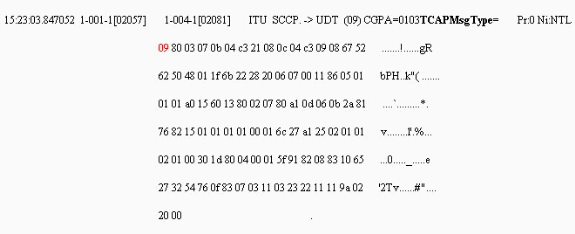
If there is an undeliverable SCCP UDT message sent from the Cisco PGW 2200 and / or an SCCP (on the remote node) has problems with the message, the Cisco PGW 2200 receives a UDTS response message. This message indicates a 'return cause' which is very useful in troubleshooting. The UDTS is message type 10 (or 0a hex).
This is an example of a UDTS SCCP message with TCAP data (from PSTN).
Note: This message is an example only and may not reflect an actual query response combination / sequence. The format and amount of information displayed varies depending on the Snooper version.
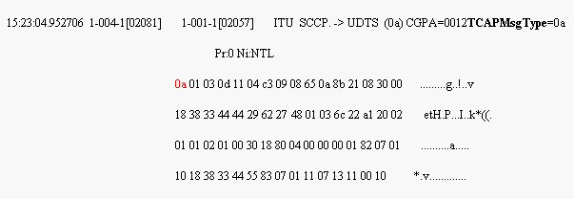
This Snooper output displays the IAM, UDT, UDTS, and REL sequence.
Note: This message is an example only and may not reflect an actual query response combination / sequence. The format and amount of information displayed varies depending on the Snooper version.
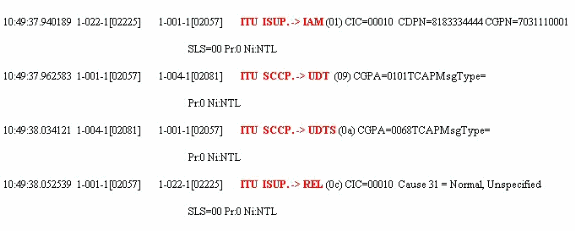
This is an SS7 sniffer trace that includes SS7 SCCP and TCAP information.
------------------------------------------------------------------------
SCP(IN)- 19/03/04 18:01:54:223 SCCP SCP(IN) UDT SCP(IN) BGN INVK IDP
--------------------------------------------------------------------------------
Octet001 ITU-T SS7 Time=19/03/02 18:01:54:223
--------------------------------------------------------------------------------
11010011 BIB/BSN 1/83
10010110 FIB/FSN 1/22
..111111 SU type/length MSU63
00...... Spare 0
--------------------------------------------------------------------------------
Octet004 Service information octet
--------------------------------------------------------------------------------
....0011 Service indicator SCCP Signalling Connection Control Part
..00.... Message priority 0
10...... Network indicator N National network
--------------------------------------------------------------------------------
Octet005 Routing label
--------------------------------------------------------------------------------
........ DPC 10337 SCP(IN)
........ OPC 10321
0001.... SLS 1
--------------------------------------------------------------------------------
Octet009 Message type
--------------------------------------------------------------------------------
00001001 Message type UDT Unitdata
--------------------------------------------------------------------------------
Octet010 SCCP Protocol Class parameter
--------------------------------------------------------------------------------
....0001 Protocol class Class 1
0000.... Message handling No special options
00000011 Ptr -> Called number 3
00000111 Ptr -> Calling # 7
00001011 Pointer -> Data 11
--------------------------------------------------------------------------------
Octet014 SCCP Called Party Address parameter
--------------------------------------------------------------------------------
00000100 Parameter length 4
.......1 Sgnl pt code bit SPC present
......1. Subsystem # bit SSN present
..0000.. Global title ind No global title included
.1...... Routing bit DPC and SSN based routing
0....... Reserved natl use 0
........ Point code 10337 SCP(IN)
00...... Spare 0
11111100 Subsystem number INAP IN-CS1+
--------------------------------------------------------------------------------
Octet019 SCCP Calling Party Address parameter
--------------------------------------------------------------------------------
00000100 Parameter length 4
.......1 Sgnl pt code bit SPC present
......1. Subsystem # bit SSN present
..0000.. Global title ind No global title included
.1...... Routing bit DPC and SSN based routing
0....... Reserved natl use 0
........ Point code 10321
00...... Spare 0
11111100 Subsystem number INAP IN-CS1+
--------------------------------------------------------------------------------
Octet024 SCCP Data parameter
--------------------------------------------------------------------------------
01100001 Parameter length 97
01100010 Tag BGN Begin, constructor, application-wide
01011111 Length 95
--------------------------------------------------------------------------------
Octet027 Originating Transaction ID
--------------------------------------------------------------------------------
...01000 Tag Originating Transaction ID
010..... Class and form Application-wide, primitive
00000011 Length 3
........ Originating ID F30051
--------------------------------------------------------------------------------
Octet032 TCAP Dialogue Portion
--------------------------------------------------------------------------------
...01011 Tag TCAP Dialogue Portion
011..... Class and form Application-wide, constructor
00100011 Length 35
--------------------------------------------------------------------------------
Octet034 TCAP External
--------------------------------------------------------------------------------
...01000 Tag TCAP External
001..... Class and form Universal, constructor
00100001 Length 33
--------------------------------------------------------------------------------
Octet036 Object identifier
--------------------------------------------------------------------------------
...00110 Tag Object identifier
000..... Class and form Universal, primitive
00000111 Length 7
00000000 Organization itu-t recommendation
00010001 q Q
........ 773 (X'305) 773
00000001 as(1) 1
00000001 Protocol data unit dialogue PDU(1)
00000001 version(1) 1
10100000 Single-ASN.1-typeTag Parameter
00010110 Length 22
--------------------------------------------------------------------------------
Octet047 Dialogue request
--------------------------------------------------------------------------------
...00000 Tag Dialogue request
011..... Class and form Application-wide, constructor
00010100 Length 20
--------------------------------------------------------------------------------
Octet049 Protocol-version
--------------------------------------------------------------------------------
...00000 Tag Protocol-version
100..... Class and form Context-specific, primitive
00000010 Length 2
00000111 Unused Bit 07
.0000000 Unused Bit 00
1....... Protocol Version Version 1
--------------------------------------------------------------------------------
Octet053 Application-context-name
--------------------------------------------------------------------------------
...00001 Tag Application-context-name
101..... Class and form Context-specific, constructor
00001110 Length 14
--------------------------------------------------------------------------------
Octet055 Object Identifier
--------------------------------------------------------------------------------
...00110 Tag Object identifier
000..... Class and form Universal, primitive
00001100 Length 12
00101010 Protocol ccitt identified-organization
10000110 SubProtocol etsi
00111010 Domain inDomain
00000000 Network in-Network
10001001 AC Name ac (application context)
01100001 Service cs1-ssp-to-scp(0)
00110011 Version Reserved
........ Contents 01 00 01 00 01
--------------------------------------------------------------------------------
Octet069 TCAP Component Portion
--------------------------------------------------------------------------------
...01100 Tag TCAP Component Portion
011..... Class and form Application-wide, constructor
10000000 Length 128
--------------------------------------------------------------------------------
Octet071 Invoke component
--------------------------------------------------------------------------------
...00001 Tag Invoke component
101..... Class and form Context-specific, constructor
00101111 Length 47
--------------------------------------------------------------------------------
Octet073 Invoke ID
--------------------------------------------------------------------------------
...00010 Tag Invoke ID
000..... Class and form Universal, primitive
00000001 Length 1
00000001 Invoke ID 01
--------------------------------------------------------------------------------
Octet076 Operation Code
--------------------------------------------------------------------------------
...00010 Tag Local
000..... Class and form Universal, primitive
00000001 Length 1
........ Operation Code IDP InitialDP
--------------------------------------------------------------------------------
Octet079 Parameter Sequence
--------------------------------------------------------------------------------
...10000 Tag Parameter Sequence
001..... Class and form Universal, constructor
00100111 Length 39
--------------------------------------------------------------------------------
Octet081 ServiceKey
--------------------------------------------------------------------------------
...00000 Tag ServiceKey
100..... Class and form Context-specific, primitive
00000001 Length 1
........ Service key 94
--------------------------------------------------------------------------------
Octet084 CalledPartyNumber
--------------------------------------------------------------------------------
...00010 Tag CalledPartyNumber
100..... Class and form Context-specific, primitive
00000111 Length 7
.0000011 Nature of address National (significant) number( national use )
1....... Odd/even Odd number of address signals
....0000 Spare 00
.001.... Numbering plan ISDN (Telephony) numbering plan (Rec. E.164)
1....... Internal network # Routing to internal network number not allowed
........ Address signals 999956738
0000.... Filler 0
--------------------------------------------------------------------------------
Octet093 CallingPartyNumber
--------------------------------------------------------------------------------
...00011 Tag CallingPartyNumber
100..... Class and form Context-specific, primitive
00000111 Length 7
.0000011 Nature of address National (significant) number( national use )
1....... Odd/even Odd number of address signals
......01 Screening Indicator User provided, verified and passed
....00.. Presentation? Presentation allowed
.001.... Numbering plan ISDN (Telephony) numbering plan (Rec. E.164)
0....... Number Incomplete? Complete
........ Address signals 2199997137
0000.... Filler 0
--------------------------------------------------------------------------------
Octet102 CallingPartysCategory
--------------------------------------------------------------------------------
...00101 Tag CallingPartysCategory
100..... Class and form Context-specific, primitive
00000001 Length 1
00001010 CallngPartyCategory Ordinary calling subscriber
--------------------------------------------------------------------------------
Octet105 ForwardCallIndicators
--------------------------------------------------------------------------------
...11010 Tag ForwardCallIndicators
100..... Class and form Context-specific, primitive
00000010 Length 2
.......0 Nat'l/International Call to be treated as a national call
.....00. End-to-end method No end-to-end method available
....1... Interworking Interworking encountered
...0.... End-to-end info No end-to-end information available
..1..... ISUP indicator ISDN user part used all the way
01...... ISUP preference ISDN user part not required all the way
.......1 Orig ISDN access Originating access ISDN
.....00. SCCP method No indication
....0... Spare 0
0000.... ReservedForNat'lUse 0
--------------------------------------------------------------------------------
Octet109 BearerCapability
--------------------------------------------------------------------------------
...11011 Tag BearerCapability
101..... Class and form Context-specific, constructor
00000101 Length 5
--------------------------------------------------------------------------------
Octet111 Bearer Cap
--------------------------------------------------------------------------------
...00000 Tag Bearer Cap
100..... Class and form Context-specific, primitive
--------------------------------------------------------------------------------
Octet112 User service information parameter
--------------------------------------------------------------------------------
00000011 Parameter length 3
--------------------------------------------------------------------------------
Octet113 User service info octet 3
--------------------------------------------------------------------------------
...00000 Transfer capability Speech
.00..... Coding standard CCITT standardized coding
1....... Extension bit 1
--------------------------------------------------------------------------------
Octet114 User service info octet 4
--------------------------------------------------------------------------------
...10000 Transfer rate 64 kbit/s
.00..... Transfer mode circuit mode
1....... Extension bit 1
--------------------------------------------------------------------------------
Octet115 User service info octet 5
--------------------------------------------------------------------------------
...00011 Layer 1 protocol Recommendation G.711 A-law
.01..... Layer 1 Identifier User information layer 1 protocol
1....... Extension bit 1
--------------------------------------------------------------------------------
Octet116 CalledPartyNumber
--------------------------------------------------------------------------------
...00010 Tag CalledPartyNumber
110..... Class and form Private use, primitive
00000010 Length 2
.0000000 Nature of address Spare
0....... Odd/even Even Number of Address signals
....1010 Spare 0A
.000.... Numbering plan Spare (no interpretation)
0....... Internal network # Routing to internal network number allowed
--------------------------------------------------------------------------------
Octet120 End-of-contents
--------------------------------------------------------------------------------
00000000 Tag 00
00000000 Length 00
--------------------------------------------------------------------------------
Checksum CRC16................ 0001011001110111 hex=1677
--------------------------------------------------------------------------------
--------------------------------------------------------------------------------
--------------------------------------------------------------------------------
SCP(IN)- 19/03/04 18:01:54:269 SCCP SCP(IN) UDT SCP(IN) CON INVK CUE
--------------------------------------------------------------------------------
Octet001 ITU-T SS7 Time=19/03/02 18:01:54:269
--------------------------------------------------------------------------------
10000001 BIB/BSN 1/1
10110010 FIB/FSN 1/50
..111111 SU type/length MSU63
00...... Spare 0
--------------------------------------------------------------------------------
Octet004 Service information octet
--------------------------------------------------------------------------------
....0011 Service indicator SCCP Signalling Connection Control Part
..00.... Message priority 0
10...... Network indicator N National network
--------------------------------------------------------------------------------
Octet005 Routing label
--------------------------------------------------------------------------------
........ DPC 10321
........ OPC 10337 SCP(IN)
1010.... SLS 10
--------------------------------------------------------------------------------
Octet009 Message type
--------------------------------------------------------------------------------
00001001 Message type UDT Unitdata
--------------------------------------------------------------------------------
Octet010 SCCP Protocol Class parameter
--------------------------------------------------------------------------------
....0001 Protocol class Class 1
0000.... Message handling No special options
00000011 Ptr -> Called number 3
00000111 Ptr -> Calling # 7
00001011 Pointer -> Data 11
--------------------------------------------------------------------------------
Octet014 SCCP Called Party Address parameter
--------------------------------------------------------------------------------
00000100 Parameter length 4
.......1 Sgnl pt code bit SPC present
......1. Subsystem # bit SSN present
..0000.. Global title ind No global title included
.1...... Routing bit DPC and SSN based routing
0....... Reserved natl use 0
........ Point code 10321 Matinha
00...... Spare 0
11111100 Subsystem number INAP IN-CS1+
--------------------------------------------------------------------------------
Octet019 SCCP Calling Party Address parameter
--------------------------------------------------------------------------------
00000100 Parameter length 4
.......1 Sgnl pt code bit SPC present
......1. Subsystem # bit SSN present
..0000.. Global title ind No global title included
.1...... Routing bit DPC and SSN based routing
0....... Reserved natl use 0
........ Point code 10337 SCP(IN)
00...... Spare 0
11111100 Subsystem number INAP IN-CS1+
--------------------------------------------------------------------------------
Octet024 SCCP Data parameter
--------------------------------------------------------------------------------
01001001 Parameter length 73
01100101 Tag CON Continue, constructor, application-wide
01000111 Length 71
--------------------------------------------------------------------------------
Octet027 Originating Transaction ID
--------------------------------------------------------------------------------
...01000 Tag Originating Transaction ID
010..... Class and form Application-wide, primitive
00000011 Length 3
........ Originating ID 7A01B4
--------------------------------------------------------------------------------
Octet032 Destination Transaction ID
--------------------------------------------------------------------------------
...01001 Tag Destination Transaction ID
010..... Class and form Application-wide, primitive
00000011 Length 3
........ Destination ID F30051
--------------------------------------------------------------------------------
Octet037 TCAP Dialogue Portion
--------------------------------------------------------------------------------
...01011 Tag TCAP Dialogue Portion
011..... Class and form Application-wide, constructor
00101111 Length 47
--------------------------------------------------------------------------------
Octet039 TCAP External
--------------------------------------------------------------------------------
...01000 Tag TCAP External
001..... Class and form Universal, constructor
00101101 Length 45
--------------------------------------------------------------------------------
Octet041 Object identifier
--------------------------------------------------------------------------------
...00110 Tag Object identifier
000..... Class and form Universal, primitive
00000111 Length 7
00000000 Organization itu-t recommendation
00010001 q Q
........ 773 (X'305) 773
00000001 as(1) 1
00000001 Protocol data unit dialogue PDU(1)
00000001 version(1) 1
10100000 Single-ASN.1-typeTag Parameter
00100010 Length 34
--------------------------------------------------------------------------------
Octet052 Dialogue response
--------------------------------------------------------------------------------
...00001 Tag Dialogue response
011..... Class and form Application-wide, constructor
00100000 Length 32
--------------------------------------------------------------------------------
Octet054 Protocol-version
--------------------------------------------------------------------------------
...00000 Tag Protocol-version
100..... Class and form Context-specific, primitive
00000010 Length 2
00000111 Unused Bit 07
.0000000 Unused Bit 00
1....... Protocol Version Version 1
--------------------------------------------------------------------------------
Octet058 Application-context-name
--------------------------------------------------------------------------------
...00001 Tag Application-context-name
101..... Class and form Context-specific, constructor
00001110 Length 14
--------------------------------------------------------------------------------
Octet060 Object Identifier
--------------------------------------------------------------------------------
...00110 Tag Object identifier
000..... Class and form Universal, primitive
00001100 Length 12
00101010 Protocol ccitt identified-organization
10000110 SubProtocol etsi
00111010 Domain inDomain
00000000 Network in-Network
10001001 AC Name ac (application context)
01100001 Service cs1-ssp-to-scp(0)
00110011 Version Reserved
........ Contents 01 00 01 00 01
--------------------------------------------------------------------------------
Octet074 Result
--------------------------------------------------------------------------------
...00010 Tag Result
101..... Class and form Context-specific, constructor
00000011 Length 3
--------------------------------------------------------------------------------
Octet076 Integer
--------------------------------------------------------------------------------
...00010 Tag Integer
000..... Class and form Universal, primitive
00000001 Length 1
........ Value accepted
--------------------------------------------------------------------------------
Octet079 Result-source-diagnostic
--------------------------------------------------------------------------------
...00011 Tag Result-source-diagnostic
101..... Class and form Context-specific, constructor
00000101 Length 5
--------------------------------------------------------------------------------
Octet081 Dialogue service user
--------------------------------------------------------------------------------
...00001 Tag Dialogue service user
101..... Class and form Context-specific, constructor
00000011 Length 3
--------------------------------------------------------------------------------
Octet083 Integer
--------------------------------------------------------------------------------
...00010 Tag Integer
000..... Class and form Universal, primitive
00000001 Length 1
........ Value Null
--------------------------------------------------------------------------------
Octet086 TCAP Component Portion
--------------------------------------------------------------------------------
...01100 Tag TCAP Component Portion
011..... Class and form Application-wide, constructor
10000000 Length 128
--------------------------------------------------------------------------------
Octet088 Invoke component
--------------------------------------------------------------------------------
...00001 Tag Invoke component
101..... Class and form Context-specific, constructor
00000110 Length 6
--------------------------------------------------------------------------------
Octet090 Invoke ID
--------------------------------------------------------------------------------
...00010 Tag Invoke ID
000..... Class and form Universal, primitive
00000001 Length 1
00000001 Invoke ID 01
--------------------------------------------------------------------------------
Octet093 Operation Code
--------------------------------------------------------------------------------
...00010 Tag Local
000..... Class and form Universal, primitive
00000001 Length 1
........ Operation Code CUE Continue
--------------------------------------------------------------------------------
Octet096 End-of-contents
--------------------------------------------------------------------------------
00000000 Tag 00
00000000 Length 00
--------------------------------------------------------------------------------
Checksum CRC16................ 0011010011100010 hex=34E2
--------------------------------------------------------------------------------
--------------------------------------------------------------------------------
--------------------------------------------------------------------------------
Troubleshoot Tip: UDTS Return Cause
For a UDTS message, the 'return cause' is the first byte after the message type 0a. This value helps determine why the STP / SCP sends a UDTS error response. If this information is not visible in the sniffer, proceed to the Platform.log TCAP Trace section in order to enable TCAP traces in the Cisco PGW 2200 log.
Platform.log TCAP Trace
MML allows a user to start a TCAP trace that dumps <Trace> messages for the TCAP channel controller into /opt/CiscoMGC/var/log/platform.log. A TCAP trace allows the user to see the TCAP / SCCP messages sent to the SS7 channel controller to route out to the SS7 switch over MTP3. See Appendix E for the message flow of a TCAP query through the PGW 2200 software.
TCAP tracing is started via mml with the sta-tcap-trc command. In order to capture the relevant information, enable debug logging for the TCAP and SS7 channel controller.
This is an example of how to enable a TCAP trace:
mml> set-log:TCAP-01:debug,confirm MGC-01 - Media Gateway Controller 2004-03-26 11:17:31.503 EST M COMPLD "TCAP-01" ; mml> set-log:ss7-i-1:debug,confirm MGC-01 - Media Gateway Controller 2004-03-26 11:17:40.715 EST M COMPLD "ss7-i-1" ; mml> sta-tcap-trc MGC-01 - Media Gateway Controller 2004-03-26 11:05:27.040 EST M RTRV SROF "TCAP-01" /* Component already started */ ;
Note: Debug logging can have an effect on system performance and should not be used in a production environment under high call volume. Please plan your maintenance window accordingly.
TCAP Messages Sent by the Cisco PGW 2200
Once an IN_TRIGGER is sent to the engine, the engine beings to send the message out of the PGW 2200. Information passed down from the protocol level is relayed to the TCAP channel controller. The TCAP portion is sent down to the SCCP channel controller. Also, a log is created in platform.log to indicate a TCAP message was 'transmitted'. From the previous UDT message (shown in the sniffer portion of this document) you can see how the PGW 2200 logs information related to this same message in the platform.log. This platform log matches the data content shown in the Sample SCCP Message Breakdown: Unitdata / Unitdata Service table in Appendix C. From this table, the first value is the data length value (52 hex = 82 decimal). The actual TCAP data portion follows the message length. In the event that sniffer or snooper is not available, this platform.log can be used to view / debug TCAP and SCCP transactions.
Troubleshoot Tip: If the TCAP message is not sent down to SCCP, there is a problem at the MDL or Engine level. Troubleshoot the MDL trace and look at the Ltrigger and LTriggerRelease signal.
This output shows the PGW 2200 log sending TCAP down stack to SCCP/MTP.

After TCAP sends the message to SCCP, the SS7 channel controller plays RECEIVED MSG FROM SCCP and logs the hex representation of the message to indicate receipt of the message. This hex dump includes the SCCP and TCAP portions as shown in this output.

Troubleshoot Tips:
-
Use the SCCP message format shown in Appendix C to decode the message type, SCCP header information (shown in the output in yellow) and the beginning of the TCAP data (shown in the output in blue). The 1e0002 in the output represents the destination point code from dpc.dat and the SCCP message dump begins immediately after type "1" (beginning with SCCP message type).
-
The PGW 2200 logs counter and Alarms for SCCP, TCAP and SS7 events. If measurements are enabled, check the counters for the TCAP message. Also check the SCCP, UDT, and UDTS received and transmitted. Refer to these documents for MGC operational procedures.
-
If the SS7 channel controller does not receive the message sent out of the PGW 2200, verify that TCAP transmitted a message down to SCCP. If the TCAP layer transmits the message down, it can be because the SCCP does not have enough information to build the proper SCCP message. This may also be an indication that the SS7 subsystem is not provisioned properly or is not available. Check this list to verify:
-
SS7 Point code configuration and status
-
SS7 Subsystem configuration
-
SS7 Subsystem routing configuration
-
Local and Remote SSN status
-
IN Service configuration (trigger.dat)
System Verification
mml>rtrv-spc:all MGC-01 - Media Gateway Controller 2004-03-26 13:22:05.492 EST M RTRV "ss7svc1:DPC=001.022.001,DNW=2:OPC=001.001.001:IS" "ss7svc2:DPC=001.022.002,DNW=2:OPC=001.001.001:IS" "itussn1:DPC=001.004.001,DNW=2:OPC=001.001.001:IS" "itussn2:DPC=001.003.001,DNW=2:OPC=001.001.001:IS" "itussn3:DPC=001.004.001,DNW=2:OPC=001.001.001:IS" ; mml> prov-rtrv:ss7subsys:NAME="itussn1" MGC-01 - Media Gateway Controller 2004-03-26 11:48:26.321 EST M RTRV "session=fix551tgp:ss7subsys" /* NAME = itussn1 DESC = pc_ssn rte-ssn 48 SVC = scp1 PRI = 1 MATEDAPC = LOCALSSN = 101 PROTO = SS7-ITU STPSCPIND = 1 TRANSPROTO = SCCP OPC = opc1 SUAKEY = REMOTESSN = 48 */ ; mml> rtrv-lssn:all MGC-01 - Media Gateway Controller 2004-03-26 11:49:01.985 EST M RTRV "TCAP-01:SSN=12,PST=IS" "TCAP-01:SSN=101,PST=IS" "TCAP-01:SSN=102,PST=IS" ; mml> rtrv-rssn:all MGC-01 - Media Gateway Controller 2004-03-26 11:49:04.695 EST M RTRV "scp1:PC=001.004.001,SSN=12,PST=IS" "scp1:PC=001.004.001,SSN=48,PST=IS" ; mml> prov-rtrv:inservice:name="finap-initdp" MGC-01 - Media Gateway Controller 2004-03-29 14:45:25.738 EST M RTRV "session=fix551tgp:inservice" /* NAME = finap-initdp SKORTCV = 90001 GTORSSN = ROUTEBYSSN GTFORMAT = NOGT MSNAME = finap-initdp */ ; mml> prov-rtrv:SS7ROUTE:NAME="route4" MGC-01 - Media Gateway Controller 2004-03-30 11:53:08.493 EST M RTRV "session=fix551tgp:SS7ROUTE" /* NAME = route4 DESC = rte to 1.4.1 scp1 OPC = opc1 DPC = scp1 LNKSET = ls3 PRI = 1 */ ;
-
-
If all of this information appears to be correct (as shown in the output displayed above) verify the tagged values sent down from the TCAP protocol level such as the SSN, SCCPCalledParty address and / or SCCPCallingParty address.
TCAP Messages that enter the Cisco PGW 2200
The reverse logic can be used to trace an SS7 message that comes into the Cisco PGW 2200 that is destined to the TCAP / SCCP user layer of the SS7 stack. The PGW 2200 logs show the SS7 message that comes into the SS7 channel controller (from the SS7 line) and is sent to TCAP for processing. The message is broken down at each layer of the SS7 stack. Also, note the OPC/DPC, Service Indicator (SIO) and signaling link selection (SLS). The OPC and DPC is represented in ITU format (in this example only).
Troubleshoot Tip: Verify the message type received from the SS7 line. If a UDTS message is receive check the 'return cause'.
This output shows the PGW 2200 log when it receives SCCP messages from the SS7 line:
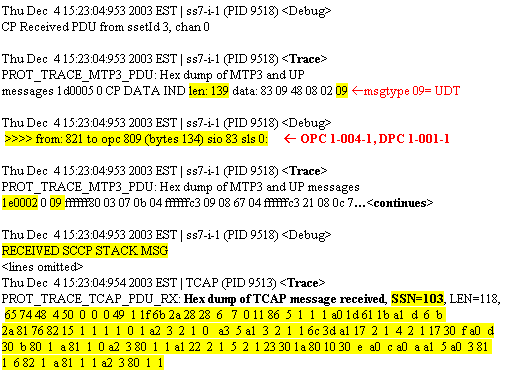
Troubleshoot Tip: Use the SCCP message format shown in Appendix C to decode the message type, SCCP header information (shown in the output in yellow) and the start of the TCAP data. The 1e0002 in the output above represents the calling address (OPC) for the message received at the PGW as represented in dpc.dat. The SCCP message dump begins immediately after the "0" (beginning with SCCP message type).
This output is from the PGW 2200 log when it receives UDTS TCAP over SCCP/MTP:
Thu Mar 25 18:35:35:385 2004 EST | ss7-i-1 (PID 27288) <Debug> CP Received PDU from ssetId 3, chan 0 Thu Mar 25 18:35:35:385 2004 EST | ss7-i-1 (PID 27288) <Trace> PROT_TRACE_MTP3_PDU: Hex dump of MTP3 and UP messages 1d0005 0 CP DATA IND len: 68 data: 83 09 48 08 a2 0a Thu Mar 25 18:35:35:385 2004 EST | ss7-i-1 (PID 27288) <Debug> >>>> from: 821 to opc 809 (bytes 63) sio 83 sls a: Thu Mar 25 18:35:35:385 2004 EST | ss7-i-1 (PID 27288) <Trace> PROT_TRACE_MTP3_PDU: Hex dump of MTP3 and UP messages 1e0002 0 0a 01 03 0d 11 04 ffffffc3 09 08 65 0a ffffff8b 21 08 30 00 18 38 33 44 44 29 62 27 48 01 02 6c 22 ffffffa1 20 02 01 01 02 01 00 30 18 ffffff80 04 00 00 00 01 ffffff82 07 01 10 18 38 33 44 44 ffffff83 07 01 11 07 13 11 00 10 Thu Mar 25 18:35:35:385 2004 EST | TCAP (PID 27283) <Debug> Got 91 bytes from fifo /tmp/sccp_input (fd=16) Thu Mar 25 18:35:35:385 2004 EST | ss7-i-1 (PID 27288) <Debug> RECEIVED SCCP STACK MSG !--- Indicates message is from MTP(SS7 stack). !--- Lines omitted. Thu Mar 25 18:35:35:385 2004 EST | TCAP (PID 27283) <Debug> 00 01 00 01 1E 00 15 00 00 00 1A 00 00 02 00 00 00 00 00 00 08 21 00 00 08 09 FFF0A 0A 01 03 0D 11 04 FFF09 08 65 0A FFF21 08 30 00 18 38 33 44 44 29 62 27 48 01 02 6C 22 FFF20 02 01 01 02 01 00 30 18 FFF04 00 00 00 01 FFF07 01 10 18 38 33 44 44 FFF07 01 11 07 13 11 00 10 Thu Mar 25 18:35:35:386 2004 EST | TCAP (PID 27283) <Debug> ioTcSuIntfc::handleNotInd: Cause =1 Thu Mar 25 18:35:35:386 2004 EST | TCAP (PID 27283) <Debug> Calling StUiStuDatReq(), spId = 1 Thu Mar 25 18:35:35:386 2004 EST | TCAP (PID 27283) <Debug> Deleted spDlgEntry 2-69 Thu Mar 25 18:35:35:386 2004 EST | TCAP (PID 27283) <Debug> Sending msgType 15 to Engine !--- TCAP sends response to Engine which is translated into L.
This output is from the PGW 2200 log when it receives an invalid TCAP message over SCCP / MTP:
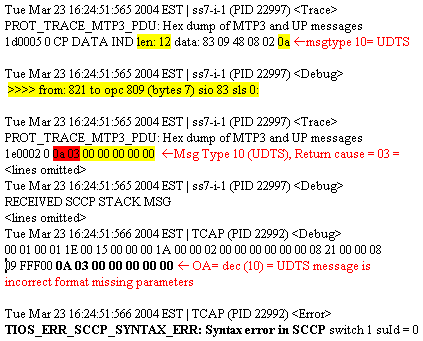
MDL Trace Tool
The Cisco PGW 2200 uses triggers to initiate a TCAP transaction. TCAP protocol transactions use the IN_TRIGGER method to send and receive messages to and from the TCAP control layer. When call analysis hits result type 22, the IN_TRIGGER TCAP protocol is initialized. TCAP information / messages are exchanged between the TCAP protocol layer (for example, triggers written in MDL language) and the Cisco PGW 2200 engine process using a tag, length, and value or TLV syntax. The engine then forwards the information to the TCAP channel controller for further processing.
Use the Cisco PGW 2200 MDL trace to see the data that is sent to and from the TCAP protocol layer to the TCAP controller (via the engine). The TCAP channel controller does the necessary processing on MDL messages received and forwards them to the appropriate IOCC (either TALI-IOCC, IP-IOCC or SS7-IOCC). The engine also converts TCAP message information received from the TCAP channel controller (via SCCP / MTP3) into a TLV format that can be passed to the TCAP protocol layer, also known as IN_TRIGGER. To trace a TCAP call at the protocol level, complete these steps:
-
Start an MDL trace.
mml> sta-sc-trc:ss7svc1:log="udts",confirm
-
Make a call that triggers a TCAP service (hits analysis result type IN_TRIGGER).
-
Stop the MDL trace.
mml> stp-sc-trc:all MGC-01 - Media Gateway Controller 2004-03-24 17:41:04.702 EST M COMPLD "ALL:Trace stopped for the following files: ../var/trace/udts_ss7svc2_20040324174103.btr
-
Run get_trc to view the captured MDL trace.
get_trc.sh udts_ss7svc2_20040324174103.btr
-
Run option S to see a 'sim print' of the call that shows the message flow between internal PGW 2200 processes.
-
Run option D to see the actual trace of the call through the PGW 2200 code.
Note: The content shown by options D and S in get_trc.sh may not be obvious to understand as the data is shown with internal data types and variable names. However a description of what to look for to debug TCAP transactions is shown in the MDL Trace Analysis for TCAP section.
MDL Trace Analysis for TCAP
Use 'sim print' (option S of get_trc.sh) to view the overall call flow at the Cisco PGW 2200 protocol level. The sim print resembles the one shown in Appendix D. If it does not, try to make a note of where the derived call flow diverges and begin to troubleshoot with that event. For TCAP troubleshooting, focus your attention on one of these events.
-
LTrigger
-
LTriggerInformation
-
LTriggerNext
-
LtriggerRelease
These are the internal events that drive the IN_TRIGGER state machine.
Use the Cisco PGW 2200 MDL trace to see the actual code flow for each of these events. LTrigger results in an OUTPUT IN_TRIGGER, and the other three are sent received by IN_TRIGGER by an INPUT IN_TRIGGER message from the engine.
Outgoing TCAP Messages
To identify messages that come in and out of MDL for TCAP, search for IN_TRIGGER in the MDL trace. The Sample IN_TRIGGER Syntax from MDL Trace graphic shows a message sent out and one received into MDL to and from the engine. The OUTPUT indicates that IN_TRIGGER has sent a request for the Engine to forward a TCAP message.
Troubleshoot Tips
-
Use the MDL trace to verify that the TRIGGER message was sent to the engine if IN_TRIGGER or OUTPUT was not sent.
-
Check the dialplan for the IN_TRIGGER result configuration.
-
Check the inservice and / or trigger.dat configuration.
-
Verify that the message was sent out of the SS7 channel controller. If the message never made it out of the SS7 channel controller, it is a result of the SCCP channel controller not having enough information to route the call or build a valid message.
-
Check the SCCP configuration and SS7_SUBSYSTEM configuration.
-
Check the SSN status.
-
Check the PC status.
If the output of the IN_TRIGGER is successful, the Cisco PGW 2200 MDL trace displays the response to that message as an INPUT into the IN_TRIGGER.
Sample IN_TRIGGER Syntax from MDL Trace 
The INPUT message is the response from the engine in reference to the request (or OUTPUT message) sent from the TCAP protocol. The engine can respond on its own behalf or on behalf of the TCAP layer.
The IN_TRIGGER message indicates that MDL sends TCAP / SCCP information down to the engine and channel controllers to be used to construct a UDT message that is sent out on the LINE to the SCP. Information sent down to the engine is derived from the trigger.dat file and it shows directly above the output of this message. To see the content of this message as MDL built it, scroll up from the text IN_TRIGGER. The start of the message building procedure is indicated by SendMessage()…, as shown here.
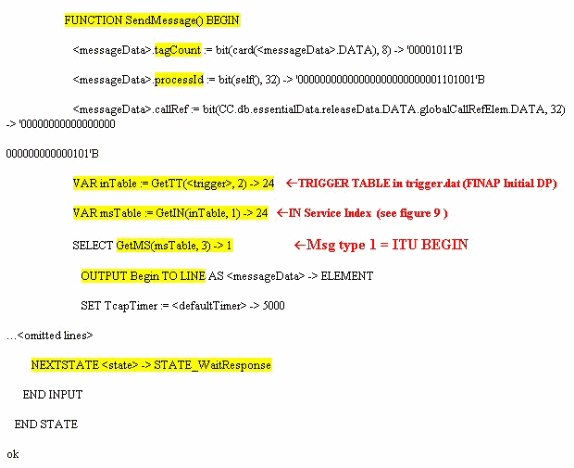
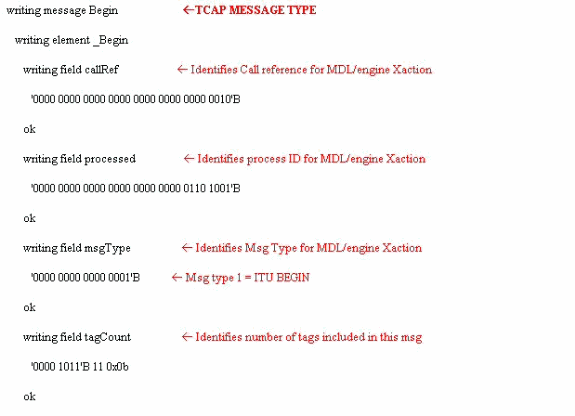
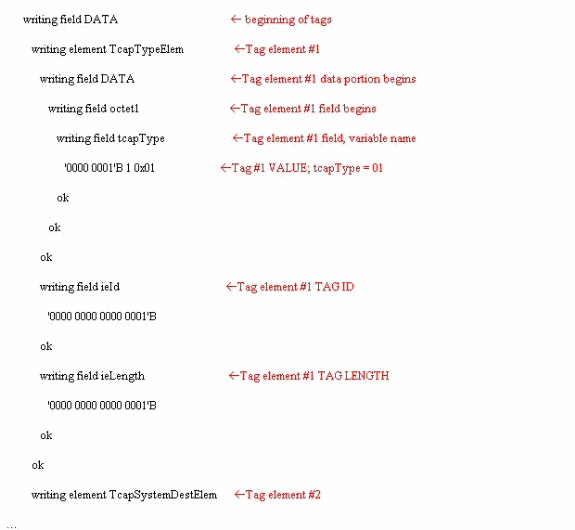
Troubleshoot Tips
-
If a TCAP query is sent out of the Cisco PGW 2200 with incorrect data, the MDL trace can be used to see exactly where the Cisco PGW 2200 derived its information. Most of the information comes from the trigger.dat file. To see where the Cisco PGW 2200 derived its information for the outgoing message, search up (from IN_TRIGGER) for the TCAP element in question. For example, if the TCAP type is incorrectly encoded, search for the string tcapType in the MDL trace (around the writing field tcapType).
-
To see where the Cisco PGW 2200 reads trigger.dat to encode TCAP content, search for the strings shown in this table. These strings represent the procedure calls used to retrieve the trigger.dat information. These procedure calls should occur between the INPUT LTrigger event and the OUTPUT IN_TRIGGER message in question.
| Name | Description | MDL Search String |
|---|---|---|
| TT | Trigger Table Record | GetTT |
| MA | Message Action Record | GetMA |
| MS | Message Sending Record | GetMS |
| OS | Operation Sending | GetOS |
| PS | Parameter Sending Record | GetPS |
| RR | Received Response Record | GetRR |
| MR | Message Receiving Record | GetMR |
| OR | Operation Receiving | GetOR |
| PR | Parameter Receiving Record | GetPR |
| RA | Response Action Record | GetRA |
| AD | Action Data | GetAD |
Incoming TCAP Messages
The INPUT message is the response from the engine in reference to the request. The engine can respond on its own behalf or on behalf of the TCAP layer. The incoming message is identified by the INPUT IN_TRIGGER message string in the Cisco PGW 2200 MDL trace as shown in this example output. This example also shows the message that is decoded. This is helpful if you need to identify any problems that may exist with the TCAP response.
To decode the Engine message received by Cisco PGW 2200 MDL, use the same TLV format described earlier in this document. These message are decoded immediately after the text, INPUT IN_TRIGGER.
INPUT "IN_TRIGGER": 00 00 00 02 00 00 00 69 00 02 0d 00 12 00 04
00 00 08 21 00 11 00 04 00 00 00 02 00 10 00 12 00 00 00 08 21 0c 01 67 02
04 50 00 00 00 00 00
08 09 00 13 00 0d 03 00 2a 81 76 82 15 01 01 01 01 00 01 00 05 00 01 01
00 06 00 03 01 00 17 00 07 00 01 04 00 09 00 0f a0 0d 30 0b 80 01 0a 81
01 00 a2 03 80 0
1 01 00 05 00 01 01 00 06 00 03 01 00 23 00 07 00 01 05 00 09 00 1a 80
10 30 0e a0 0c a0 0a a1 05 a0 03 81 01 06 82 01 0a 81 01 01 a2 03 80 01
01 00 0a 00 00
reading element header: TcapMessageStyle
reading field callRef
!--- Identifies call reference for MDL / engine Xaction.
'0000 0000 0000 0000 0000 0000 0000 0010'B
ok
reading field processed
!--- Identifies process ID for MDL/engine Xaction.
'0000 0000 0000 0000 0000 0000 0110 1001'B
ok
reading field msgType
!--- Identifies message type for MDL/engine Xaction.
'0000 0000 0000 0010'B
!--- Message type 2 = ITU CONTINUE.
ok
reading field tagCount
!--- Identifies the number of tags included in this message.
'0000 1101'B 13 0x0d
ok
ok
reading element _Continue
!--- TCAP message type.
reading field RAW
1136 bits read
ok
reading field DATA
reading element header: TcapElementStyle
!--- Tag element #1.
reading field ieId
!--- Tag element #1 TAG ID.
'0000 0000 0001 0010'B
ok
reading field ieLength
!--- Tag element #1 Tag Length.
'0000 0000 0000 0100'B
!--- 4 bytes.
ok
ok
reading element TcapDatabaseIdElem
reading field RAW
32 bits read
ok
reading field DATA
!--- Tag element #1 data portion begins.
'0000 0000'B 0 0x00
!--- Byte 1.
'0000 0000'B 0 0x00
!--- Byte 1.
'0000 1000'B 8 0x08
!--- Byte 1.
'0010 0001'B 33 0x21 "!"
!--- Byte 1.
''B
ok
ok
reading element header: TcapElementStyle
!--- Tag element #2.
reading field ieId
This is sample output of an incoming response to a UDTS message:
INPUT "IN_TRIGGER": 00 00 00 02 00 00 00 69 00 0f 02 00 0b
00 01 01 00 0a 00 00
reading element header: TcapMessageStyle
reading field callRef
'0000 0000 0000 0000 0000 0000 0000 0010'B
ok
reading field processId
'0000 0000 0000 0000 0000 0000 0110 1001'B
ok
reading field msgType
!--- Message type - Information message.
'0000 0000 0000 1111'B
ok
reading field tagCount
'0000 0010'B 2 0x02
ok
ok
reading element _Information
reading field RAW
72 bits read
ok
reading field DATA
reading element header: TcapElementStyle
reading field ieId
'0000 0000 0000 1011'B
ok
reading field ieLength
'0000 0000 0000 0001'B
ok
ok
reading element TcapErrorElem
!--- TCAP error element.
reading field RAW
8 bits read
ok
reading field DATA
reading field octet1
reading field error
'0000 0001'B 1 0x01
!--- TCAP error element = 01 —> TCAP_ERROR_SSN_OOS.
ok
ok
ok
ok
ok
ok
Continuing State Machine: IN_TRIGGER (105)
STATE *
INPUT Information AS <messageData>
CC.db.nonEssentialData.TCAPTransactionUnixEndTimeElem.DATA
:= MGetTime(CC.db.nonEssentialData.TCAPTransactionMsecEndTimeElem.DATA)
-> 1080257735
Another valuable piece of information you can obtain from the Cisco PGW 2200 MDL trace (for TCAP calls) is the LTriggerRelease cause value. The INErrorElem encoded in the LTriggerRelease also provides insight into why a call or TCAP transaction does not work as expected. See this Cisco PGW 2200 MDL graphic that shows a LTriggerRelease that is sent out in response to the initial LTrigger event received by IN_TRIGGER. See Appendix E for details about IN_TRIGGER events and INErrorElem values.
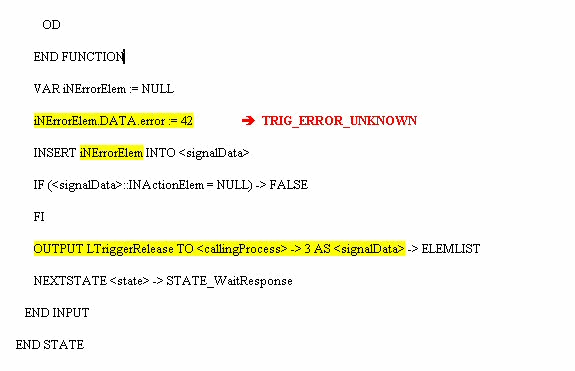
Appendix A: MDL Tags
The Cisco PGW 2200 MDL tags are exchanged between the Cisco PGW 2200 MDL and the engine. This Appendix describes the order, content, and format of all tags used in TCAP transactions. The information used to populate these tag values is obtained from call context and values populated in the trigger.dat file. The trigger file is also used to indicate what should be sent to / from the engine for TCAP message building and what should be received from the engine for TCAP message processing when a response is received.
These tags are used for TCAP call processing:
-
TAG ID 1 – TCAP Type
Description: Indication of the type of TCAP MDL
Data Length: fixed(1)
Data Format:
1 = ETSI 300 374-1 2 = Bell Core GR-1298-CORE TR-NWT-001284 TR-NWT-001285 3 = Bell Core Pre AIN GR-1428-CORE -
TAG ID 2 – System Destination
Description: Internal Destination of event
Data Length: fixed(1)
Data Format: Octet
Contents: 0 = Internal SCP, 1 = Trillium TCAP
-
TAG ID 3 – SCCP Called Address
Description: SCCP data required by trillium
Data Length: Variable
Data Format:
Octet 1 Routing Indicators Bit A 0 - Route by GT, 1 - Route by SSN Bit B DPC is present (Octets 2 to 4 have valid data) Bit C SSN is present (Octet 5 has valid data) Octet 2 DPC Network Octet 3 DPC Cluster Octet 4 DPC Member Octet 5 Called SSN Octet 6 GTFormat 0 - No global Title Included 1 - Global Title includes nature of address indicator only (ITU) - Global title includes translation type, numbering plan and encoding scheme.(ANSI) 2 - Global Title Includes translation type only.(ITU/ANSI) 3 - Global title includes translation type, numbering plan and encoding scheme. (ITU). - not used in ANSI. 4 - Global Title includes translation type, numbering plan, encoding scheme and nature of address digits. (ITU). - Not used in ANSI. Octet 7 Translation Type Value Octet 8 Numbering Plan 0 - Unknown 1 - ISDN Telephony 2 - Telephony 3 - Data 4 - Telex 5 - Maritime Mobile 6 - Land Mobile 7 - ISDN Mobile Octet 9 Nature Of Number 1 - Subscriber Number 2 - National Number 3 - International Number Octet 10 Number Of Digits in octets 11 to 43 Octet 11 to 43 Digits in IA5 format -
TAG ID 4 – SCCP Calling Address
Description: SCCP data required by trillium
Data Length: Variable
Data Format:
Octet 1 Routing Indicators Bit A 0 - Route by GT, 1 - Route by SSN Bit B DPC is present (Octets 2 to 4 have valid data) Bit C SSN is present (Octet 5 has valid data) Octet 2 DPC Network Octet 3 DPC Cluster Octet 4 DPC Member Octet 5 Calling SSN -
TAG ID 5 – TCAP Component Type
Description: Type of TCAP component
Data Length: fixed(1)
Data Format:
Octet 0 = Unknown 1 = Invoke 2 = Return Result Last 3 = Return Error 4 = Reject 5 = Return Result Not Last 6 = Invoke Last 7 = Invoke Not Last -
TAG ID 6 – TCAP Operation Code
Description: TCAP message operation code
Data Length: Variable (Always 4 for ANSI)
Data Format:
Octet 1 Flag 0 = None 1 = Local 2 = Global 3 = National 4 = Private Octet 2 Operation Class Octet 3 Op Code Highest byte (ITU) Family (ANSI) Octet 4 Op Code Next byte (ITU) Specifier (ANSI) Octet n Op Code Least byte (ITU) -
TAG ID 7 – TCAP Invoke ID
Description: ID of the component
Data Length: fixed(1)
Data Format: Octet
-
TAG ID 8 – TCAP Correlation ID
Description: ID of the component that this component correlates to
Data Length: fixed(1)
Data Format: Octet
-
TAG ID 9 – TCAP Dialogue Component ANSI
Description: Body of a TCAP message from first parameter onwards
Data Length: Variable
Data Format: Octet
-
TAG ID 10 – TCAP Dialogue End Marker
Description: Body of a TCAP message from first parameter onwards (SEQUENCE)
Data Length: fixed(0)
Data Format: None
-
TAG ID 11 – Error
Description: Error data
Data Length: fixed(1)
Data Format: Octet
Contents:
1 = TCAP_ERROR_SSN_OOS 2 = TCAP_ERROR_PC_UNAVAILABLE 3 = TCAP_ERROR_SERVICE_NOT_RESPONDING 4 = TCAP_TRIGGER_TIMEOUT
-
TAG ID 12 – STP-SCP group index
Description: STP-SCP group index, data passed from analysis.
Data Length: fixed(1)
Data Format: Octet
Contents: STP-SCP group index value.
-
TAG ID 13 – TCAP Transport Protocol
Description: Type of transport protocol
Data Length: fixed(1)
Data Format: Octet
Contents:
1 = TCAP_TRANSPORT_SCCP 2 = TCAP_TRANSPORT_TCP_IP
-
TAG ID 14 – TCAP External Error / Problem
Description: Error or Problem value received or sent in Error & Result components
Data Length: Variable
Data Format: Octet
-
TAG ID 15 – TCAP Body Type
Description: Type of body of component
Data Length: fixed(1)
Data Format: Octet
Contents:
1 = TCAP_BODY_SEQUENCE 2 = TCAP_BODY_SET
-
TAG ID 16 – TCAP Dialog info
Description: Trillium TCAP includes this TAG in all the messages sent to MDL. MDL should store this information and send it to the Trillium TCAP in all subsequent messages for the dialog or unidirectional messages related to the call.
Data Length: Variable
Data Format: Octet
-
TAG ID 17 – TCAP Transaction Id
Description: Trillium TCAP includes this TAG in all the messages sent to MDL. MDL should store this information for sending to CDB.
Data Length: Variable
Data Format: Octet
-
TAG ID 18 – TCAP Database Id
Description: Trillium TCAP will include this TAG in all the messages sent to MDL. MDL should store this information for sending to CDB.
Data Length: Variable
Data Format: Octet
Appendix B: Log off SS7 Point Codes
ETSI PC 1-1-1 (padded to 16 bits) = 00001000 00001001 = 08 09 = 809 (shown in log) ETSI PC 1-4-1 (padded to 16 bits) = 00001000 00100001 = 08 21 = 821 (shown in log) ETSI PC 3-3-3 (padded to 16 bits) – 00011000 00011011 = 18 1B = 181b (another ex.)
| Cluster | Network | Member | Point Code | |
|---|---|---|---|---|
| ESTI (14 bits) | 3 bits | 8 bits | 3 bits | 14 bits |
| ANSI (24 bits) | 8 bits | 8 bits | 8 bits | 24 bits |
| PC 1-1-1 (no padding, 14 bit only) | 001 | 000 00001 | 001 | 001000 = 8 00000001 = 01 |
| PC 1-4-1 (no padding, 14 bit only) | 001 | 00000100 | 001 | 001000 = 8 00100001 = 21 |
| PC 3-3-3 | 011 | 00000011 | 011 | 011000 = 18 00011011 = 1B |
Appendix C: SCCP Message Types
| Message Type | Message Type Code |
|---|---|
| CR Connection request | 0000 0001 |
| CC Connection confirm | 0000 0010 |
| CREF Connection refused | 0000 0011 |
| RLSD Released | 0000 0100 |
| RLC Release complete | 0000 0101 |
| DT1 Data form 1 | 0000 0110 |
| DT2 Data form 2 | 0000 0111 |
| AK Data acknowledgement | 0000 1000 |
| UDT Unitdata | 0000 1001 |
| UDTS Unitdata service | 0000 1010 |
| ED Expedited data | 0000 1011 |
| EA Expedited data acknowledgement | 0000 1100 |
| RSR Reset request | 0000 1101 |
| RSC Reset confirmation | 0000 1110 |
| ERR Protocol data unit error | 0000 1111 |
| IT Inactivity test | 0001 0000 |
| XUDT Extended unitdata | 0001 0001 |
| XUDTS Extended unitdata service | 0001 0010 |
| LUDT Long unitdata | 0001 0011 |
| LUDTS Long unitdata service | 0001 0100 |
Unitdata (UDT)
The UDT message contains:
-
Three pointers
-
The parameters indicated in this table.
| Parameter | Q.713 reference | Type (F V O) | Length (octets) |
|---|---|---|---|
| Message type | 2.1 | F | 1 |
| Protocol class | 3.6 | F | 1 |
| Called party address | 3.4 | V | 3 minimum |
| Calling party address | 3.5 | V | 3 minimum |
| Data | 3.16 | V | 2-X (Note 1) |
Note: Due to the ongoing studies on the SCCP called and calling party address, the maximum length of this parameter needs further study. It is also noted that the transfer of up to 255 octets of user data is allowed when the SCCP called and calling party address do not include global title.
Unitdata service (UDTS)
The UDTS message contains:
-
Three pointers.
-
The parameters indicated in this table.
| Parameter | Q.713 reference | Type (F V O) | Length (octets) |
|---|---|---|---|
| Message type | 2.1 | F | 1 |
| Return cause | 3.12 | F | 1 |
| Called party address | 3.4 | V | 3 minimum |
| Calling party address | 3.5 | V | 3 minimum |
| Data | 3.16 | V | 2-X (Note) |
Note: Due to the ongoing studies on the SCCP called and calling party address, the maximum length of this parameter needs further study. It is also noted that the transfer of up to 255 octets of user data is allowed when the SCCP called and calling party address do not include global title.
This table shows a sample SCCP message breakdown for the Unitdata / Unitdata service:
| Parameter | Type (F V O) | Length (octets) | Correlation outgoing message | Correlation incoming message |
|---|---|---|---|---|
| Message type | F | 1 | 09 | 0a |
| Protocol class | F | 1 | 80 | 01 |
| Called party address pointer | F | 1 | 03 | 03 |
| Calling party address pointer | F | 1 | 07 | 0d |
| Data Pointer | F | 1 | 0b | 11 |
| Called party address | V | 3 minimum | 04 c3 21 08 0c | 04 c3 … 30 00 |
| Calling party address | V | 3 minimum | 04 c3 09 08 67 | 18 38 33 44 44 |
| Data (TCAP DATA) | V | 04 c3 09 08 67 18 38 33 44 44 Data (TCAP DATA) V | 52 62 … 20 00 | 29 62 … 00 10 |
Note: These messages are examples only and may not reflect an actual query response combination / sequence.
UDTS Return Causes
In the Unitdata service, Extended Unitdata service, or Long Unitdata service message, the "return cause" parameter field is a one octet field that contains the reason for a message return. Bits 1 through 8 are coded as shown here:
Value Bits 0 0 0 0 0 0 0 0 0 no translation for an address of such nature 1 0 0 0 0 0 0 0 1 no translation for this specific address 2 0 0 0 0 0 0 1 0 subsystem congestion 3 0 0 0 0 0 0 1 1 subsystem failure 4 0 0 0 0 0 1 0 0 unequipped user 5 0 0 0 0 0 1 0 1 MTP failure 6 0 0 0 0 0 1 1 0 network congestion 7 0 0 0 0 0 1 1 1 unqualified 8 0 0 0 0 1 0 0 0 error in message transport (Note) 9 0 0 0 0 1 0 0 1 error in local processing (Note) 10 0 0 0 0 1 0 1 0 destination cannot perform reassembly (Note) 11 0 0 0 0 1 0 1 1 SCCP failure 12 0 0 0 0 1 1 0 0 hop counter violation 13 0 0 0 0 1 1 0 1 segmentation not supported 14 0 0 0 0 1 1 1 0 segmentation failure 15 0 0 0 0 1 1 1 1 to 228 1 1 1 0 0 1 0 0 Reserved for International Use 229 1 1 1 0 0 1 0 1 to 254 1 1 1 1 1 1 1 0 Reserved for National Networks 255 1 1 1 1 1 1 1 1 Reserved
Appendix D: MDL Interface for TCAP Message
All messages adhere to a common TLV format:
-
Call Instance and ProcessId - 8 bytes long and should be received by the Engine and returned in the response message from the Engine unaltered.
-
Message ID - Identifies the message that is sent or received by TCAP protocol layer (values shown in this table).
-
Tagged Id - Number of tags and tag data (tag ID, data length and data) dictate what is sent out in the TCAP message to the remote destination. All field sizes are fixed except for the data field of a tag item whose length is variable and is defined (in octets) by the data length.
Octet 1-8 Octet 9-10 Octet 11 Octet 12-13 Octet 14-15 Octet 16 – (15+n) Octet (17+n) -(16+n) Octet (18+n)- (17+n) ... Call Instance and Process ID Message ID Number of tags Tag ID X Data length (n) Data Tag ID y Data length (m) …. Each of the fields Total Length, Call Instance and Process Id, Message Id, Tag Id and Data Length is transmitted by the most significant byte first.
1 ITU Begin 2 ITU Continue 3 ITU End 4 ITU Abort 6 ANSI QueryWithPermission 8 ANSI Response 9 ANSI ConversationWithPermission 99 ANSI ConversationWithOutPermission 17 ANSI Abort 12 ANSI Protocol Abort 11 ANSI User Abort 5 Unidirectional 15 Information 16 Release
Appendix E: Internal MDL Interface
Internally, communication with TCAP State Machine Objects (SMOs) is through signals with data. Any MDL data type can be sent with the signal. The names and meanings of the signals and data are listed here.
-
LTrigger
Description: This is the first signal that LCM sends to TCAP to start the dialogue. In Elan, INTriggerElem also contains the stpScpGroupIndex. MSG_ACTION_COPY_STP_SCP_INDEX_FROM_SIGNAL_DATA must be set in the MA table for this to be used.
Components: INTriggerElem, BNumberElem, BNumberDataElem
-
LTriggerInformation
Description: This signal is sent from TCAP to LCM in response to LTrigger, when the dialogue continues.
Components: INTriggerElem, BNumberElem, BNumberDataElem
-
LTriggerNext
Description: This signal is sent from LCM to TCAP as a subsequent trigger request in an existing dialogue.
Components: INTriggerElem, BNumberElem, BNumberDataElem
-
LTriggerRelease
Description: This signal is the last to be sent from either LCM or TCAP and can be sent from TCAP in response to LTrigger after a response has been received from the SCP.
Components: INErrorElem, BNumberElem, BNumberDataElem
INErrorElem has these values :
1 TRIG_ERROR_NONE, 2 TRIG_EXIT_UNABLE_TO_COMPLETE_MA_IS_LNP_M_BIT_CLEAR, 3 TRIG_ERROR_NULL_TRIGGER, 4 TRIG_ERROR_TRIGGER_TABLE_NOT_FOUND, 5 TRIG_ERROR_UNKNOWN_MESSAGE_ACTION, 6 TRIG_ERROR_UNKNOWN_RESPONSE_ACTION, 7 TRIG_ERROR_UNKNOWN_PARAMETER_ACTION, 8 TRIG_ERROR_MESSAGE_ACTION_FAILED, 9 TRIG_ERROR_UNABLE_TO_LOAD_DIALOGUE_COMPONENT, 10 TRIG_ERROR_UNABLE_TO_LOAD_TAG, 11 TRIG_ERROR_READING_TT, 12 TRIG_ERROR_READING_MA, 13 TRIG_ERROR_READING_PS, 14 TRIG_ERROR_READING_RR, 15 TRIG_ERROR_READING_PR, 16 TRIG_ERROR_READING_RA, 17 TRIG_ERROR_ACTION_NOT_COMPATIBLE_IN_PR, 18 TRIG_ERROR_NO_ACTION_DATA_FOR_ACTION_RE_TRIGGER, 19 TRIG_ERROR_NO_ACTION_DATA_FOR_ACTION_SEND_ACTION_TO_LCM, 20 TRIG_ERROR_UNKNOWN_MESSAGE_IN_MS, 21 TRIG_ERROR_UNKNOWN_PR_ACTION, 22 TRIG_ERROR_UNABLE_TO_COMPLETE_MA_COPY_SCCP_GT_FROM_BNUMBER, 23 TRIG_ERROR_UNABLE_TO_COMPLETE_MA_COPY_STP_SCP_INDEX_FROM_SIGNAL_DATA, 24 TRIG_ERROR_UNKNOWN_DIALOGUE_COMPONENT, 25 TRIG_ERROR_SIGNAL_IN_WRONG_STATE, 26 TRIG_ERROR_SCCP_TIMEOUT, 27 TRIG_ERROR_IN_RESPONSE_OPERATION_CODE_MISSING, 28 TRIG_ERROR_IN_RESPONSE_INVOKE_ID_IN_USE, 29 TRIG_ERROR_IN_RESPONSE_INVOKE_ID_NOT_FOUND, 30 TRIG_ERROR_IN_RESPONSE_CORROLATION_ID_NOT_FOUND, 31 TRIG_ERROR_IN_RESPONSE_UNEXPECTED_CORROLATION_ID, 32 TRIG_ERROR_IN_RESPONSE_NO_COMPONENT_CONTENTS, 33 TRIG_ERROR_IN_RESPONSE_INVALLID_COMPONENT_CONTENTS, 34 TRIG_ERROR_IN_RESPONSE_UNEXPECTED_INVOKE_ID, 35 TRIG_ERROR_IN_RESPONSE_EXTERNAL_ERROR_NOT_FOUND, 36 TRIG_ERROR_ABORT, 37 TRIG_ERROR_USER_ABORT, 38 TRIG_ERROR_PROTOCOL_ABORT, 39 TRIG_ERROR_UNKNOWN
Related Information
Revision History
| Revision | Publish Date | Comments |
|---|---|---|
1.0 |
23-Jul-2008 |
Initial Release |
 Feedback
Feedback